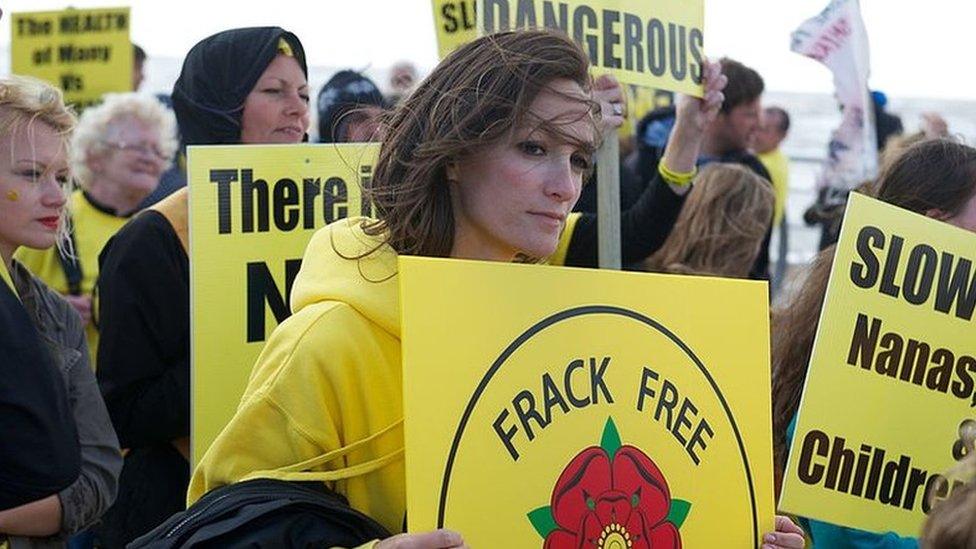Fracking 'exploitation' report dismissed by energy department
- Published
Protesters erected a mocked-up fracking rig outside Parliament
The energy department has dismissed a report that "60% of the UK countryside could be exploited" for fracking, the controversial gas extraction method.
The Independent reported that more than 32,000 square miles, external could be affected, notably in south, north-west and north-east England and central Scotland.
It said it based this on official maps, but the department called the 60% figure "nonsense".
Meanwhile, about 300 people have held an anti-fracking protest in London.
The process of fracking involves pumping water and chemicals into shale rock at high pressure to extract gas.
It was temporarily banned after it was blamed for two earthquakes in Lancashire in 2011, but according to the Independent, Energy Secretary Ed Davey will soon end the moratorium.
Responding to the Independent's article, a department spokesman said: "There is a big difference between the amount of shale gas that might exist and what can be technically and commercially extracted.
"It is too early to assess the potential for shale gas but the suggestion more than 60% of the UK countryside could be exploited is nonsense.
"We have commissioned the British Geological Survey to do an assessment of the UK's shale gas resources, which will report its findings next year."
'England's heartland'
The government is currently considering a report by an independent panel of experts published in April on the future of fracking in the UK.
The report recommended fracking should continue, but under stricter regulations.
Environmental campaign group Greenpeace has said its own analysis shows the extent of potential shale sites is widespread.
Executive director John Sauven said: "Two thirds of England, including large swathes of countryside, is now under active consideration for a risky, polluting, expensive form of fossil fuel extraction.
"The potential for shale gas to bring down bills is overhyped, while experts agree local opposition is a serious threat to the industry's viability.
"The coalition bust-up over wind energy will pale in comparison to the political spats that are likely to occur if [Chancellor] George Osborne tries to push ahead with gas fracking in the heartlands of England's countryside."
Imitation rig
Meanwhile, protesters have held a protest against fracking in the UK.
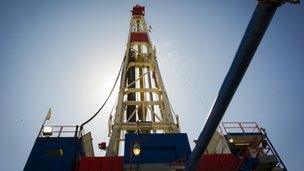
Fracking has been blamed for the pollution of water supplies and causing minor earthquakes
BBC reporter Ben Ando, at the scene in London, said about 300 people were marching.
They laid a mock pipeline in Grosvenor Square from the Canadian High Commission to the US embassy, as a sign of their "outrage at the continued exploitation of high-carbon tar sands", lobby group Campaign Against Climate Change said.
They later marched to Parliament Square, where they built an imitation 23ft (7m) "fracking rig" outside Parliament.
A delegation delivered a letter to Downing Street, calling for a ban on exploration and development of shale gas and coal bed methane.
"In an effort to step up the focus of attention on this harmful technique and its effect on people, landscape and ecosystems in Britain, residents of Sussex, Falkirk, Belfast, the Fylde, the Ribble Estuary and the Vale of Glamorgan have come together as a UK-wide deputation to ask for action, not words, on this crucial subject," the group, Britain & Ireland Frack Free, said in a statement.
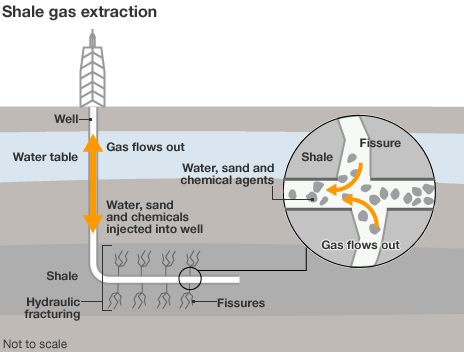
- Published17 April 2012
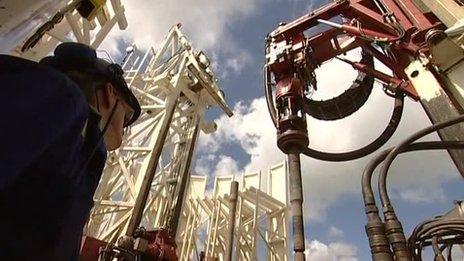
- Published17 April 2012
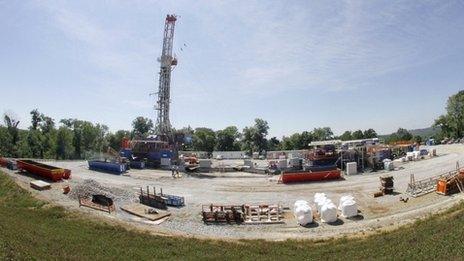
- Published19 March 2012
